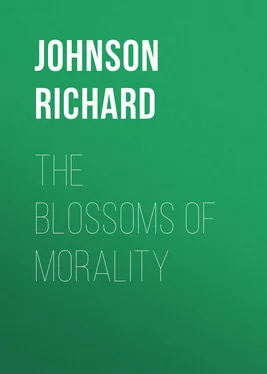Richard Johnson - The Blossoms of Morality
Здесь есть возможность читать онлайн «Richard Johnson - The Blossoms of Morality» — ознакомительный отрывок электронной книги совершенно бесплатно, а после прочтения отрывка купить полную версию. В некоторых случаях можно слушать аудио, скачать через торрент в формате fb2 и присутствует краткое содержание. Жанр: foreign_antique, foreign_prose, на английском языке. Описание произведения, (предисловие) а так же отзывы посетителей доступны на портале библиотеки ЛибКат.
- Название:The Blossoms of Morality
- Автор:
- Жанр:
- Год:неизвестен
- ISBN:нет данных
- Рейтинг книги:4 / 5. Голосов: 1
-
Избранное:Добавить в избранное
- Отзывы:
-
Ваша оценка:
- 80
- 1
- 2
- 3
- 4
- 5
The Blossoms of Morality: краткое содержание, описание и аннотация
Предлагаем к чтению аннотацию, описание, краткое содержание или предисловие (зависит от того, что написал сам автор книги «The Blossoms of Morality»). Если вы не нашли необходимую информацию о книге — напишите в комментариях, мы постараемся отыскать её.
The Blossoms of Morality — читать онлайн ознакомительный отрывок
Ниже представлен текст книги, разбитый по страницам. Система сохранения места последней прочитанной страницы, позволяет с удобством читать онлайн бесплатно книгу «The Blossoms of Morality», без необходимости каждый раз заново искать на чём Вы остановились. Поставьте закладку, и сможете в любой момент перейти на страницу, на которой закончили чтение.
Интервал:
Закладка:
Though Ernestus loved his parents with all the affections of a dutiful child, yet he could not help rejoicing at the idea of embarking in the bustle of the world, and making a figure as a man. On the other hand, Fragilis could not prevail on himself to quit the apron-string of his mother, and engage in the rude clamour of a commercial life, in which so much attention, thought, and industry, are required. Neither could his parents part with their darling, whose constitution they had spoiled, and rendered unfit for business. Ernestus, in a short time after, by his own desire, was placed as a clerk in a merchant's house in London; while Fragilis continued with his parents, to squander away his time in destructive scenes of indolence and luxury.
Five years had glided away as it were imperceptibly, when Ernestus found himself disengaged from the ties of his clerkship. His person was by this time arrived at the state of manhood, his figure was graceful and genteel, and his mind was improved from the polite companies he had engaged in at his leisure hours. As business had ever been the first object of his attention, and as he had thereby made himself of no small consequence to his late master, the latter, to connect him more closely with his interests, offered Ernestus his daughter in marriage, and a considerable share in the trade of the house. Such a flattering offer could not admit of a moment's hesitation, especially as a secret passion had long mutually glowed in the bosom of each party. They were married, and they were happy.
Soon after this period, a most dreadful inundation happened on the sea-coast, on the very spot where the houses and lands of the parents of Ernestus and Fragilis were situated. Dreadful indeed it was, for it not only washed down their houses, but drowned some hundreds of cattle, and left that as a part of the briny ocean, which, but a few hours before, was beautiful meadows and gardens, adorned with every thing pleasing to regale the appetite, or please the eye.
Deplorable indeed was now the situation of those two families: their houses washed away, their cattle destroyed, and all their fruitful lands, on the produce of which their fortunes depended, were irrecoverably lost, and become of no value. Surely, to support such a situation with any tolerable degree of tranquility of mind, requires more courage and philosophy than generally fall to the lot of imperfect mortals!
After the first transports of terror and affright were a little abated, and calm reason and reflection succeeded the sad emotions of horror and despair, the old Ernestus thus addressed the fair partner of his misfortunes: —
"My dearest Emelia," for that was the name of his amiable lady, "in the midst of this terrible misfortune, we have the happiness to reflect, that what has befallen us is not derived from any fault of our own, but by the pleasure of Him who gave us every thing, and who has a just right to take what he pleases from us. Though he has taken from us our house and lands, he has still graciously left us our beloved son, who will not fail to console us in our misery, and who will perhaps help us in our distresses. Though we are deprived of our fortune, we have the pleasing consolation to reflect, that, by bringing him up in the school of Prudence and Industry, we have secured him from sinking under the wreck of our present calamity. Nothing can more contribute to soften the calamities of good parents, than to reflect that their children are not exposed to partake of their miseries."
The heart of this amiable spouse was, for some time, too full of grief for the misfortune she felt, to give any immediate reply: but, at last, recovering her usual spirits and sensibility, she withdrew her head from the bosom of her generous husband, on which it had been for some time tenderly reclined.
"Ah! my beloved partner of happiness and misery," said she, "why am I thus sorrowful and wretched? why do I thus fly in the face of Providence, for depriving us only of the baubles of life? Have I not still left an amiable and tender husband, and a dutiful and beloved son. These are treasures which I still possess – treasures infinitely beyond those I have lost – treasures that will support me in the stormy hour of adversity, and enable me to make a mockery and derision of every thing that the cruel hand of fabled Fortune can inflict."
She then caught her husband in her arms, and there fainted, rather through excess of joy than grief. Virtuous minds, however they may be distressed for a moment, by unforeseen accidents, soon find an inexpressible consolation in the integrity of their hearts.
Such was the character of Ernestus and his lady, that this dreadful calamity was no sooner known, than all the neighbouring gentry flocked round them, and seemed to contend with each other for the honour of assisting such distinguished characters. What is the empty parade of riches acquired by fraud, rapine, and plunder, when compared to the heartfelt satisfaction which virtue in distress must have here felt?
It may reasonably be supposed, that it was not long before this dreadful calamity of these amiable parents reached the ears of young Ernestus. A youth, brought up in the wilds of modern extravagance, would have exclaimed, perhaps in bitter terms, on being thus suddenly deprived of a fine patrimonial estate; he would, probably, have even arraigned the severe hand of Providence, and have dared to utter impieties against his omnipotent Maker!
Such was not the conduct of Ernestus. His parents had taken care to give him, not a flighty and frothy, but a rational and manly education, the foundation of which was honour, probity, and virtue; not folly, luxury, and vanity. It is a just proverb, that the first seasoning sticks longest by the vessel, and that those who have been accustomed, in their early days, to tread the paths of Prudence, will seldom, when they grow up, run into those of Folly.
Ernestus received the news of this terrible calamity, just as he and his lady returned from a party of pleasure. It is too often found, that after pleasure comes pain, and never was it more truly verified than in this instance; with this exception, that here the one was not the consequence of the other.
He tenderly embraced his lady, took leave of her for the present, and instantly set out for the fatal scene of ruin, to assist, console, and comfort, his unfortunate parents. What passed between them in the first moments of their meeting, afforded such a scene of tenderness and affection, as exceeds the possibility of description to reach: the feelings of the heart, in such a situation, exceed every thing the most lively imagination can fabricate.
Ernestus found his dear parents had taken shelter in the house of an old gentleman, who lived in the neighbourhood, who was immensely rich, and had neither children nor relations living. Here they enjoyed all the consolation and comfort their generous hearts could wish for; nor was the young Ernestus suffered to contribute his mite to their aid. "It is enough," said the old gentleman of the house, "that you have lost your patrimony; but I have riches sufficient, and have no near relation to succeed me. How can I dispose of it better than in cherishing the distressed, and in taking virtue by the hand to raise it above the wrecks of fortune?"
In a little time after, this worthy old gentleman paid the debt of nature, and left the bulk of his fortune to the parents of Ernestus; who, by this act of generosity, were become as opulent as ever, and consequently resumed their former figure in the world. The fortune of young Ernestus was every day increasing, from his great success in commerce, till he at length found himself master of a sufficient independency, when he quitted trade; and he and his lady retired to the country, where they passed their days under the same roof with their parents, happy in themselves, and diffusing happiness to all who lived within the circle of their knowledge.
Читать дальшеИнтервал:
Закладка:
Похожие книги на «The Blossoms of Morality»
Представляем Вашему вниманию похожие книги на «The Blossoms of Morality» списком для выбора. Мы отобрали схожую по названию и смыслу литературу в надежде предоставить читателям больше вариантов отыскать новые, интересные, ещё непрочитанные произведения.
Обсуждение, отзывы о книге «The Blossoms of Morality» и просто собственные мнения читателей. Оставьте ваши комментарии, напишите, что Вы думаете о произведении, его смысле или главных героях. Укажите что конкретно понравилось, а что нет, и почему Вы так считаете.












